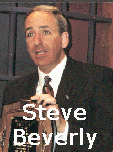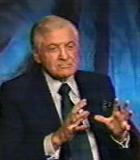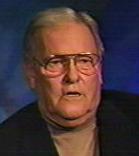
What the Masters Are Saying
 Tuesday night on CNN was the equivalent of visiting with old friends. The soon-to-be AOL News Network brought back two of television's "retired" masters to lend their perspectives on the current game show
renaissance, if---in fact---that is what we are experiencing. If Tom Kennedy and Monty Hall don't know the game, who does?
Tuesday night on CNN was the equivalent of visiting with old friends. The soon-to-be AOL News Network brought back two of television's "retired" masters to lend their perspectives on the current game show
renaissance, if---in fact---that is what we are experiencing. If Tom Kennedy and Monty Hall don't know the game, who does?
Tom's and Monty's opinions, though edited, provided disciplined expertise on whether this whole explosion of prime time big money will implode just as quickly as it erupted last summer.
 Surprisingly, to me, Hall believes a scandal similar to the ones which brought down the houses in the 1950s could reoccur, despite federal laws which could lead to large fines and jail terms. Monty bases his view on the size of the purses involved and the pressure for ratings. He wasn't even remotely involved in the original controversy. However, Monty saw what happened firsthand to Jack Barry and Dan Enright. NBC---which had taken over production of Twenty-One from its creators---brought Hall in to emcee the final four episodes of in 1958 after Barry was forced to concentrate full-time on a defense. On the 21 shows Monty hosted, the game was being played honestly----but the ratings had already fallen. Surprisingly, to me, Hall believes a scandal similar to the ones which brought down the houses in the 1950s could reoccur, despite federal laws which could lead to large fines and jail terms. Monty bases his view on the size of the purses involved and the pressure for ratings. He wasn't even remotely involved in the original controversy. However, Monty saw what happened firsthand to Jack Barry and Dan Enright. NBC---which had taken over production of Twenty-One from its creators---brought Hall in to emcee the final four episodes of in 1958 after Barry was forced to concentrate full-time on a defense. On the 21 shows Monty hosted, the game was being played honestly----but the ratings had already fallen.
 Kennedy, on the other hand, believes the security practices are so tight today, a new scandal is virtually impossible. Tom and I have had both telephone and online conversations about this issue and the responses we've had from contestants on the current big-money shows back up Kennedy's view. Celebrated Greed player Dan Avila told us he, Curtis Warren and Melissa Shirvo were all escorted to separate dressing rooms before taping the show where Warren and Shirvo opted to take home $400,000 each and Avila missed a $2.2 million question. Reason? The producers wanted no possibility of collusion, since the final question would require an individual decision. Kennedy, on the other hand, believes the security practices are so tight today, a new scandal is virtually impossible. Tom and I have had both telephone and online conversations about this issue and the responses we've had from contestants on the current big-money shows back up Kennedy's view. Celebrated Greed player Dan Avila told us he, Curtis Warren and Melissa Shirvo were all escorted to separate dressing rooms before taping the show where Warren and Shirvo opted to take home $400,000 each and Avila missed a $2.2 million question. Reason? The producers wanted no possibility of collusion, since the final question would require an individual decision.
I come closer to Tom's view, though well accepting why Monty is still skeptical. Whereas producers will be under pressure to boost ratings when the audiences decline---as they inevitably will---the '50s-era scandal largely occurred because sponsors controlled the time periods on the networks. Revlon was the sole sponsor for most of the years of The $64,000 Question and Charles Revson's tampering on that show is legend. Pharmaceuticals, Inc. (the Geritol/Sominex folks), is the company which leaned heavily on Dan Enright not to repeat his opening night 0-0 tie debacle on the original Twenty-One.
Today, the networks control their own time slots and sell the time to a variety of sponsors, none of which wield enough influence singularly to kill a show. Whereas, the FCC does not regulate networks (only their local affiliates), commissioners and the Congress could legislate a network out of existence if it attempted to pull those same shenanigans. Monty is right, human nature being what it is, some inane producer who has no connection with the past could fly off the handle and try to fix a show. However, Tom's perspective prevails, in my opinion. The precautionary measures are so strong on both the producers and the contestants, the system is almost fool-proof. On Who Wants to Be a Millionaire, the question writers are not even allowed to meet Regis Philbin.
Where I am in concert with Monty is his fear of the current mad competition leading to these shows killing their own success by eating each other alive. NBC made the smartest move of all in withdrawing Twenty-One from a direct hit by Millionaire for its second show. Greed and Winning Lines will be mauled in the Nielsens by WWTBAM this weekend and the producers and networks have to know it. Greed has already been through the joyous experience twice. For hardcore fans, the VCRs will be rolling Saturday at 8 on WL.
The late television critic Don Freeman once said in an interview with Tom Snyder: "Television is the only entertainment medium in which you succeed by knocking off your competition. On Broadway, if one play succeeds, other shows will get audiences. If a movie is hot, people tend to go see other films."
Hall has history on his side here about the competition. During the 1950s, on nine different occasions, game/quiz shows in prime time knocked off other programs of the same genre. That was when we had a peak of 24 quiz and panel shows on the networks at night. In the current era, we saw head-to-head scheduling strategies when we had only two prime time games. Think back to November. In one of my previous colums, I registered a fear the networks would go to the well too quickly in trying to knock off other quizzes head-to-head. ABC is playing that card recklessly. That is the nature of the television business.
As for existing shows rushing to joining the bigger-purse race, Bob Barker, who is The Price Is Right's executive producer as well as its host, has the right idea. "We're not going to change The Price Is Right after what we've been doing for 28 years," Barker told CNN. Monty Hall was asked that same question by Phil Donahue about Let's Make a Deal in 1974 when Pyramid, Name That Tune and a number of other shows (ultimately Tune and The $128,000 Question kicking things into six figures again) hiked their prizes. At the time, Deal was offering daytime big deals between $3,000-$5,000 and peaked at about $10,000 at night. "We're not going to get bigger," Monty said. "It's not how much we give away. It's the way we do it." The size of the prize is not what eventually killed Let's Make a Deal in 1977. It was age, a show which had simply run its course after nearly 14 years.
Barker is right. Price is plainly the audience, come on down, the wheel, the showcase and----in no small measure---Barker. The number of zeroes in the prizes will not dictate the destiny of TPIR.
Something Tom Kennedy told me in October cued me to keep an eye on one element of the current situation. "Just because we have a major hit in Millionaire doesn't mean we have a major comeback for the game show," he wrote me. "We may just have a Millionaire rage because of the nature of that show." Right now, we have one monster hit. We have one which is in the top 20 after its premiere. We have a third which is offering substantially improved demographics for its network but has settled in the middle of the pack in the Nielsens. A fourth has won its time period in its debut with only marginally better demos than the show it replaced.
We have at least five other games on the midburner for the networks, including the legendary $1,064,000 Question. If the ratings for the four we have now hold steady, you'll see all of the in-the-wings efforts migrate to prime time. If the current quartet show an early sign of decline, you'll see a retreat.
Let's face it: this is a genre which almost no network programmer (except the perceptive former ABC executive Michael Davies) wanted. The few games tried in the past 29 years in network prime time had failed. Network executives are far more comfortable in dealling with the David Kelleys and the Stephen Bochcos of the world because this is where they feel they get their "prestige." Remember what CBS' Les Moonves said about Winning Lines?: "This is not a show I would ordinarily be scheduling....it's a case of jumping on the bandwagon." Even NBC's Garth Ancier's quip this week equating a hit quiz show with "being on crack," a big high when the ratings are up and a big crash when it fails. Truth is, that's the same case for any genre which becomes a megahit.
The networks are holding their noses at this and plowing ahead because even with million-dollar jackpots, the shows make megaprofits if they even get average ratings.
Tom Kennedy and Monty Hall have seen it all. They were both around in the late '50s and the mid-1970s, the two eras prior to now where game/quiz shows hit their highest peaks. That's why CNN had them on last night. They are in a better position, based on past experience, to analyze whether we're in a rage over one show---or a bundle.
Back to Homepage

Family-Approved Site by The Dove Foundation
Allen Ludden
Art James
Wink Martindale
Tom Kennedy
Dennis James
George DeWitt
Jack Narz
Betty White
Jay Wolpert
Game $how Page
Newhoo Games
G.S. Knowledge
Game Show Themes
G.S. Software
GO Games
TV Trivia
 Game Show Network
Game Show Network


|
|



 Game Show Network
Game Show Network

